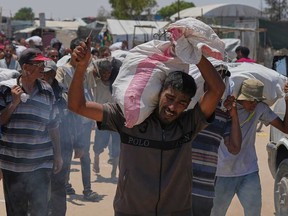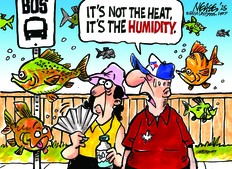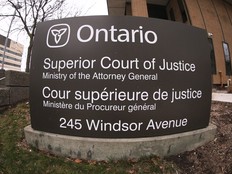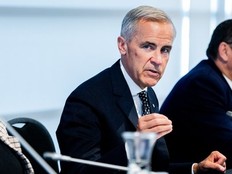KINSELLA: Canada once mattered on the international stage – not anymore
In recent years, we've been reduced to thumbing out sanctimonious tweets from the sidelines, far removed from the action

Article content
When a country doesn’t matter militarily or diplomatically, when no one is sharing intelligence with it anymore, all that it has left are … empty words, basically. Piety and preaching. That’s it.
So, now, when it comes to world affairs, Canada is a season’s ticket holder in the nosebleed seats. Holding up homemade signs, hollering, hoping to get on TV, while the real action is playing out elsewhere, far, far away.
Ever since 2004, when Paul Martin and his brain trust thought it would be a good idea to meet the homicidal Libyan dictator Muammar Qaddafi in a tent in the desert, Canada has mattered less and less internationally. It all happened gradually. We became a bit of an afterthought, and then a punchline.
Donald Trump, in particular, knows this. He’s noticed that the rest of the world hasn’t rallied to our side as he’s openly coveted us as his 51st state.
It was not always thus.
At one time – say, when Lester B. Pearson won a Nobel Peace Prize in 1957 for resolving the Suez Crisis, or when Brian Mulroney fought to end apartheid in the Eighties, or when Jean Chretien refused to participate in George W. Bush’s war against Saddam Hussein in 2003 – Canada truly mattered on the international stage. Not so much anymore.
In recent years, we’ve been reduced to thumbing out sanctimonious tweets from the sidelines, far removed from the action. In both official languages, bien sur.
So, Prime Minister Mark Carney issued a statement Thursday on X. Here’s part of what it said:
“Canada condemns the Israeli government’s failure to prevent the rapidly deteriorating humanitarian disaster in Gaza. Israel’s control of aid distribution must be replaced by comprehensive provision of humanitarian assistance led by international organizations. Many of these are holding significant Canadian-funded aid which has been blocked from delivery to starving civilians. This denial of humanitarian aid is a violation of international law.”
Carney’s X post wasn’t a serious statement by a head of a country. It was a selfie, basically, issued to get someone to notice us on a metaphorical global Jumbotron. (And: we won’t duck, if they do.)
When all you have left is words, words arguably matter. So, let’s look at those five concluding words in Carney’s declaration: “A violation of international law.” Is it?
Well, the first problem is international law itself. International law is a vague set of rules and principles, rarely if ever enforced. International law isn’t written down anywhere, so you can make it into whatever you want, as Carney has done.
The Canadian Prime Minister seems to be referring to “the right to food,” which is mentioned in the Universal Declaration of Human Rights and the International Covenant on Economic, Social and Cultural Rights. The first, in its article 25, says that “everyone has the right to … food.” The second says, in its article 11, that there exists “the fundamental right of everyone to be free from hunger.”

Good. Yes. Agreed. But in the case of Gaza, the fact is this: the Gaza Humanitarian Foundation (GHF) – an American organization, supported by Israel – was set up to prevent Hamas from stealing food, water, medicine and tents. On good days, the GHF has distributed as much as three million meals daily. American contractors and Israeli troops oversee all that, at four different distribution centres in Gaza.
As of this week, however, more than 1,000 trucks containing GHF aid are sitting idle in Gaza – because the United Nations adamantly refuses to administer the desperately-needed food to Palestinians. The UN doesn’t dispute that, either. It says that it can’t distribute the GHF aid because, for the first time in its existence, it’s concerned about bureaucracy.
“I don’t think we need to add another layer of for-profit organizations,” UN spokesperson Stephane Dujarric sniffed.
To recap the facts, then: Food is going in to Gaza. Israel and the U.S. are sending it. The food is not being properly distributed, however. And the UN, which is actually paid to do these things, is adamantly refusing to help out.
RECOMMENDED VIDEO
Another pesky fact: Gaza is a war zone. Neither Hamas nor Israel permits non-combatants into that war zone. So where, exactly, did Prime Minister Carney get the evidence to back up his claim that Israel is, quote unquote, “violating international law?”
Not from Canadian diplomats or military observers – we don’t have any in Gaza. And we designated Hamas, Gaza’s government, as a terrorist entity way back in 2002. So how is the PMO and Global Affairs getting their information about Gaza?
This writer contacted the PMO and and Global Affairs and asked: “On what basis did the Prime Minister determine Israel has broken international law in the distribution of aid in Gaza? Does Canada presently have any official representatives on the ground in Gaza? Or have we instead relied upon hearsay accounts and/or the government there, which is run by a terrorist entity?”
At press time, neither had provided an answer.
Like we say, we’re up in the nosebleeds, trying to get noticed.
It isn’t working.














Postmedia is committed to maintaining a lively but civil forum for discussion. Please keep comments relevant and respectful. Comments may take up to an hour to appear on the site. You will receive an email if there is a reply to your comment, an update to a thread you follow or if a user you follow comments. Visit our Community Guidelines for more information.